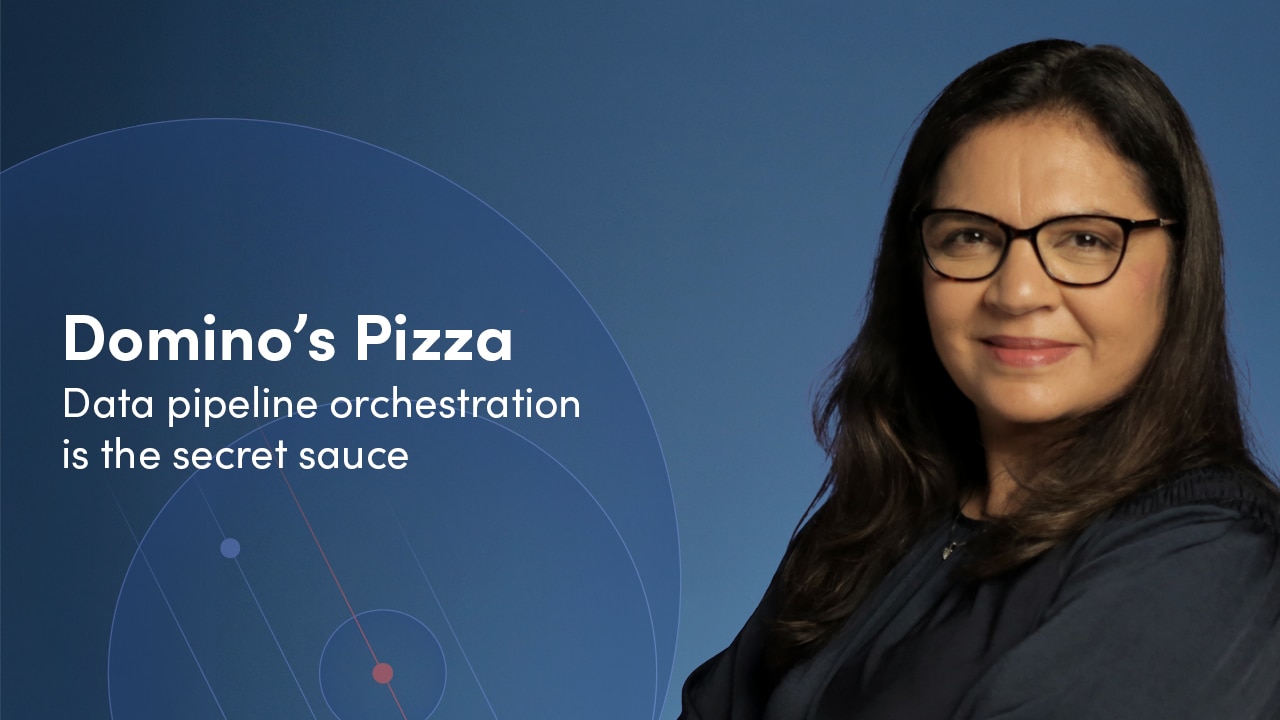Let us know how we can help
Sales & Pricing
Speak to a rep about your business needs
Help & Support
See our product support options
General inquiries and locations
Contact usCompany Overview
In business since 1960, Domino’s Pizza is now the largest pizza company in the world, serving millions of customers online and at 20,000+ stores in 90 global markets. In 2022, the company had global retail sales of $17.5 billion, with approximately two-thirds generated through digital channels. A purpose- inspired and performance-driven company built on entrepreneurship and innovation, Domino’s continually strives to solve customer needs in new and relevant ways. “We’ve become a technology company that delivers pizza,” says Deepti Soni, Senior IT Manager of Data Quality, Data Operations, and MLOps.

The Challenge
Since 2007, Domino’s has focused on leveraging data and technology to create cutting-edge experiences that attract new customers and provide franchisees and executives with the analytics they need to make better business decisions faster. From the Domino’s Tracker® & Pizza Builder introduced in 2008 to the many innovative ordering platforms the company now runs on its AnyWare technology, Domino’s is continually reestablishing itself as a data-driven business. But, consistently churning out unique customer experiences and data- fueled insights is no easy task.
Every day, Domino’s funnels data from internal supply chain and staffing systems, sales and orders from 16,000 U.S. and select international stores, and third parties into more than 3,000 data pipelines and a data warehouse.
Getting data into the warehouse means ingesting, staging, and transforming it for use by multiple analytics pipelines, dashboards, reports, and other systems that drive decision-making on food quality and customer satisfaction, sharing important information back to franchisees so they can run their locations effectively.
Each data pipeline requires many coordinated interactions with a complex mix of technologies, including MicroStrategy, AMQ, Apache Kafka, Confluent, GreenPlum, Couchbase, Talend, SQL Server, and Power BI, to name a few. “Our team ensures that data pipelines are built to provide data across the organization, from inside and outside of Domino’s, to provide key insights that support decision-making,” explains Soni.
The Solution
To ensure that its data pipelines run successfully at scale in production, while also adhering to strict service level agreements (SLAs), Domino’s needed a platform capable of orchestrating application and data workflows across the company’s evolving tech stack. And with rapidly growing data volumes and expanding business modernization initiatives, the platform had to be flexible enough to support long-term needs. Domino’s selected Control-M from BMC because of its proven stability and its ability to integrate with any application, data source, and system of record.
Control-M gives Domino’s IT teams the robust operational capabilities and controls they need to ensure business services are delivered reliably and efficiently. Several key capabilities include:
- Complex workflow orchestration and dependency scheduling
- Data pipeline visualization through a single view
- Proactive notifications when workflows fail
- Intelligent predictive analytics for SLA performance
- Self-service access for IT, data teams, and business users
“From business intelligence and marketing teams to franchisees and executives, many leaders across the company rely on output from data pipelines orchestrated by Control-M,” says Soni. “Control-M gives us the tools we need to deliver these critical reports and business services with confidence every day.
The Results
Since implementing Control-M, Domino’s has:
- Orchestrated 3,000 data pipelines
- Improved its SLA performance
- Achieved significant growth in data volume
- Produced critical reports faster
- Delivered new executive and franchisee reports
- Successfully rolled out new business services
Looking ahead, Domino’s is not resting on its laurels. While the company already orchestrates massive amounts of data, it is constantly adding more data sources to attract new customers and better serve existing ones. Domino’s is currently processing data in near real time and working toward achieving real-time analytics. “Control-M is mission-critical to Domino’s data-driven culture. It’s going to play a key role in helping us continue to grow and deliver cutting-edge innovation,” says Soni.

Every single data attribute is critical to help us piece together the story and evaluate how we are doing. We always strive to outperform ourselves.
Read more customer stories
Customer Story
REWE digital GmbH
REWE digital Maximizes Food Retail Logistics Performance with Control-M
Customer Story
Raymond James
Control-M Helps Raymond James Scale to Support Business Growth and Regulatory Requirements


